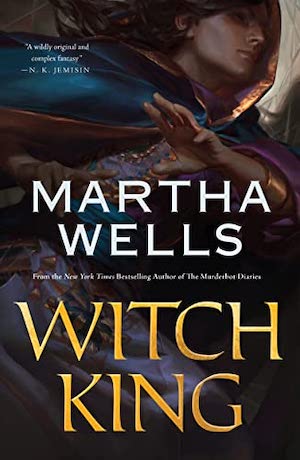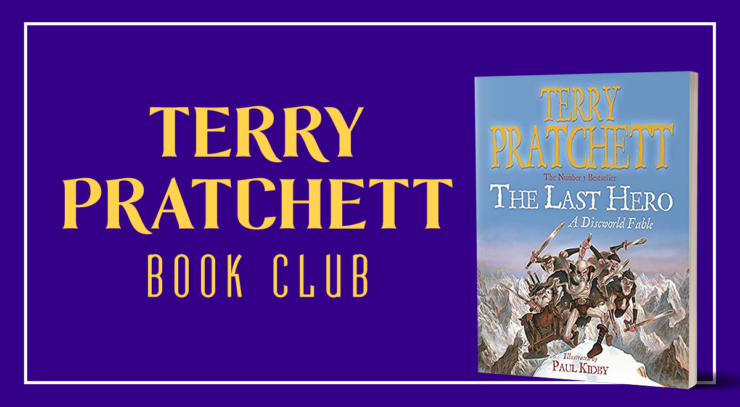The world is ending again. But probably not the way you were expecting it to.
Summary
Lord Vetinari is at Unseen University learning about the omniscope (which is supposed to be able to see through time and space), hoping that it can be used to locate Cohen the Barbarian; he’s received a letter that Cohen and his cohort have left their ruling posts in the Agatean Empire, and are preparing to take a giant bomb to the god’s mountain of Cori Celesti. The goal is to “give back” the thing man stole from them (being fire). If they do this, they will disrupt the magical field of the world and destroy it. The horde—plus a minstrel they’ve kidnapped, to everyone’s confusion—is already at the base of the mountain, and they are keen to complete this mission. They bother Cohen about the kidnapped minstrel not being up to scratch, however, since he’s not the epic poetry sort. Vetinari asks to speak to anyone who knows Cohen personally, and winds up with Rincewind planted in front of him. Rincewind tells the Patrician all he knows about Cohen, and how he conquered the Agatean Empire with the Silver Horde, and how he manages to bring people around to his way of thinking.
Buy the Book


Witch King
Vetinari then goes to talk to Leonard of Quirm about the possibility of making a vessel that could carry people to the center of the world and up a great mountain. Leonard instantly has a thought in mind already; a flying machine. Vetinari is suspicious of Leonard going directly to a flying machine because his flying machines tend to crash. Leonard, on the other hand, is adamant that he can make this happen, and quite quickly too. He gives a presentation to Vetinari’s group about falling off the world and using that momentum to propel you back up to the world and into the sky. After asking the wizards to perhaps create a wind for the vessel’s launch, everyone is roughly on the same page, but more people from across the world keep arriving and demanding to be involved in the decision-making process. Vetinari creates several sub-committees to that end, creating a miscellaneous committee with all the people who will actually make the decisions. He tells the group that the vessel can only be manned by three, one of whom has to be Leonard because he’ll be figuring out how the thing works as they launch it. Carrot volunteers to be the second passenger, which Vimes and Vetinari (and Ridcully, through no fault of his own) cosign.
Rincewind rushes into the room to let them know that he does not want to be a part of the mission, but that he’s also certain he’s about to be volunteered anyhow, so he’s volunteering to cut out the middle man. Cohen tells the minstrel that he wants a saga and that he’ll pay tons of rubies for it, and the minstrel wants to protest, but there’s the rubies to consider. He agrees and only then learns that it’s going to be the saga of how all these men die. Cohen explains to him how sagas are written and when the minstrel asks why they’re doing this, the central reason seems to be—because the world let them get old. The horde is attacked, but Cohen demands that everyone hold because he thinks he knows their attackers. Meanwhile, a flotilla leaves Ankh-Morpork as Leonard works on his vessel and Vetinari complains about how much money this is costing them. Ponder is rolling the omniscope across the deck with a log hits their ship and the thing breaks… but this turns out to be a fortuitous turn of events. Cohen is talking to Evil Harry Dread who, like them, is also lamenting that things aren’t the way they used to be. No one wants evil villains about anymore. Old Vincent the Ripper of the Silver Horde died choking on a cucumber.
Cohen tells Harry he can join them with his crew of henchmen, even if they can’t trust him, and he agrees. They are introduced to each of them in turn, including a zombie, a dwarf, a troll, a couple of lizard guys, and a jailer. Vetinari is concerned over their second ship holding all the dragons—Sybil’s dragons, in fact, which means that he needs to be concerned for their safety. He’s still hoping that the other plan might work out… which is all the various priests of all the various religions getting together to pray to the gods in hopes that they can work something out. (That plan is going about as well as one could expect.) Cohen’s group is about to reach the Impassable Caves of Dread, which contain quite a few monsters that they’ll have to defeat. Meanwhile, Death is trying to understand the uncertainty principle by doing a Schrödinger’s cat experiment where he takes a kitten out of a box periodically to know it’s alive. He’s not quite getting the hang of the concept, to Albert’s dismay, but Death realizes that the fate of the world is suddenly in the balance again, and decides to put off the experiments for now.
Commentary
Final Rincewind book. Which is relevant for the fact that this is the only time when Rincewind has stepped forward and said “I’m gonna do the thing because if I don’t, it’ll happen anyway.” Proof that even middle-aged wizards can locate a little growth as they move through life.
One of my favorite things about this book is how hilariously vague the setup is? We know Vetinari got a letter, we know the letter let him know the world was about to end and how, we know that people are coming from all over the Disc to discuss it, but that’s it. We don’t spend a lot of time hearing about who’s arriving, or going over the verbiage of the letter, or even getting some sort of teaser where Cohen and the band grab their bomb and capture the minstrel. We’re dropped into things in media res, and then given very little specifics about why this is being handled the way it is. Which makes sense given the mechanics of Ankh-Morpork, but also has the advantage of lending a sense of urgency that’s sort of… blurry? Which I enjoy, for some reason.
Also love that Vetinari named the important committee that was actually going to decide how they handled the problem the “Miscellaneous” committee. And the way he moves things along without anyone really noticing (e.g. telling Ridcully he’s already agreed when he hasn’t spoken).
There’s a way with openings in many Discworld books, but I’d be lying if I didn’t admit that this is a favorite of mine. Of course, there’s a great deal of melancholy here betwixt the humor, because the last book dealt with what makes humans human, but this one is dealing with how mortality works on us. You get the inherent group comedy that Pratchett is master of with large sets of characters, but what’s happening to Cohen and his horde can only be tragic. It’s not that they deserve “better” so much as that we all have to contend with being other than we were at some point in our lives, often increasingly as we approach the end of things. This was several years before Pratchett’s Alzheimer’s diagnosis, but it was clearly already on his mind.
I’m less into Harry as our example of a stereotypical supervillain only because we’ve never seen the like of him on the Disc, which takes away from my willingness to go along with “villain rules.” And I say that as a person who loves a good villain. Also, I appreciate the shout-out to Xena we get with Vena the Raven-Haired, but… she’s gay, honey. She may have dabbled with men but she certainly didn’t marry one, and if you’d parodied her more exactly, you’d already have your minstrel—it’s her wife.
Having noted that, it’s hard not to enjoy Cohen’s explanations of how epic poetry works, particularly if you have any experience reading/studying the stuff.
As an aside, the idea of Vetinari being worried for these dragons Leonard demanded they recruit, because he doesn’t want Sybil Ramkin to get mad at him if they are so much as scratched, is solid gold. It didn’t scare him enough to enlist her help, but he knows his reign of “benevolent’ terror will be over quickly if Sybil’s dragons are mistreated.
Ponder thinks he’s not a good hero type because his imagination is too vivid and Vetinari thinks that makes a great deal of sense, and that this only doesn’t affect Leonard poorly because he thinks in “shapes and space” instead of “thoughts and pictures,” but he’s missing a trick here. Which is funnier to me because of course Vetinari doesn’t peg what is likely to be a key component in Ponder’s difficulty—having a good imagination creates anxiety, Havelock. Ponder doesn’t want to be a hero because his imagination is good enough to scare him.
I get it, Ponder.
Asides and little thoughts:
- Leonard wanting apprentices instead of craftsmen because “I have no use for people who have learned the limits of the possible,” like dang, my guy, that’s harsh. Like even if it were true (not sure I buy that one), it’s okay to be really good at doing stuff a certain way and sticking to it, provided you’re not a mean, close-minded person. Be nice.
- “They don’t have a clue about poems longer’nn seventeen syllables.” Aw, haiku joke.
- I’m just saying, Pratchett has made the “shoe full of wee” joke more than once, and maybe it’s a British thing because that’s not the first place my mind goes to when thinking of gross childhood accidents? Just curious about whether this is a cultural divide thing, or a specific visual he enjoys evoking.
Pratchettisms:
That’s the advantage of space. It’s big enough to hold practically anything, and so, eventually, it does.
People think that it is strange to have a turtle ten thousand miles long and an elephant more than two thousand miles tall, which just shows that the human brain is ill-adapted for thinking and was probably originally designed for cooling the blood. It believes mere size is amazing.
The wizards, once they understood the urgency of a problem, and then had lunch, and argued about the pudding, could actually work quite fast.
Now something stood in the centre of the hall. It looked, to the arts-educated Patrician, like a big magnifying glass surrounded by rubbish.
Most gods were people-shaped; people don’t have much imagination, on the whole.
This was going to be a difficult adventure. It was a good job that it was to be the last.
That was the centre of this genius—he invented things that anyone could have thought of, and men who can invent things that anyone could have thought of are very rare men.
The minstrel’s thoughts ran like this: These men are rubies insane. They are rubies sure to kill me. Rubies. They’ve dragged me rubies all the rubies rubies.
But parallel dimensions meant that anything you did, you didn’t do somewhere else.
Next we’ll read up to:
They landed. It’s a short sentence, but contains a lot of incident.










